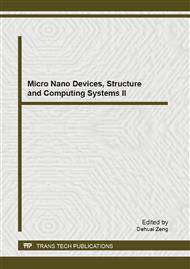p.460
p.466
p.472
p.476
p.480
p.485
p.490
p.496
p.502
Adaptive Control with Supraunitary Relative Degree for the DC Electrical Machine
Abstract:
In order to obtain an appropriate control for the electrical drive systems the real parameters values must be known accurately. Moreover, due to the parametric and structural uncertainty of the DC drive system, an adaptive control method is necessary. Therefore, a new model reference adaptive control (MRAC) for DC drives is proposed in this paper. MRAC ensures on-line adjustment of the control parameters with DC machine parameter variation. The adaptive control developed in this paper assures the asymptotic cancellation of the tracking error, fast and smooth responses of the DC drive without knowing a priory any information about the DC drive parameters. The simulation results show the validity of the proposed solution.
Info:
Periodical:
Pages:
480-484
DOI:
Citation:
Online since:
March 2013
Authors:
Price:
Сopyright:
© 2013 Trans Tech Publications Ltd. All Rights Reserved
Share:
Citation:


